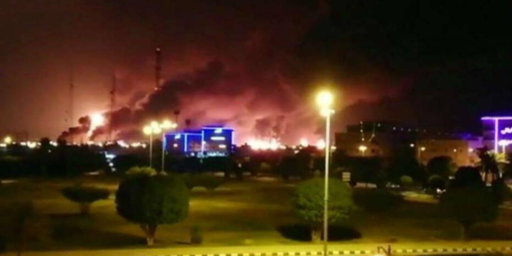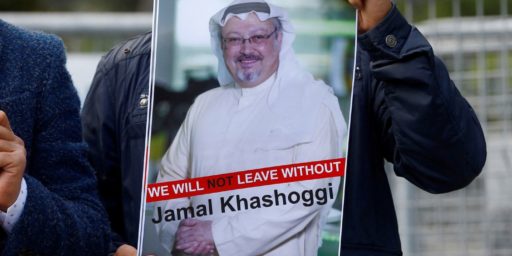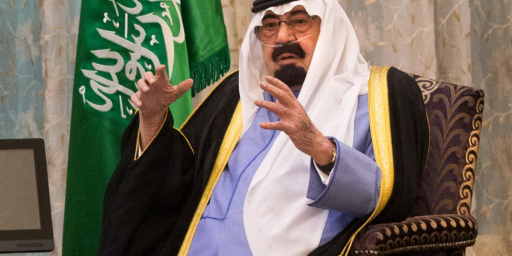Baharaini Opposition Asks For Help From U.S., U.N.
It didn’t take long for others in the world to see the intervention in Libya as an opportunity to plead their own case:
Bahrain’s opposition asked for U.N. and American intervention in the government crackdown on the Shiite protests trying to loosen the monarchy’s grip, in a brief protest Sunday in the capital that disbanded before police could arrive to break it up.
The 18 opposition legislators protesting Sunday at the U.N. offices in Manama resigned last month to protest the crackdown on the monthlong revolt, inspired by the pro-democracy uprisings across the Arab world. Bahrain’s king declared martial law last week, and a Saudi-led military force from other Gulf nations is in the country to back the Sunni monarchy.
In the five-minute protest, the lawmakers appealed to the U.N. to stop the violence against protesters and mediate talks between the opposition and the monarchy; they asked the U.S. to pressure the Gulf force to leave.
Not at all likely to happen, of course, but it does lead one to wonder why the world is willing to look the other way in Baharain, but not in Libya.







Really, Doug? In your mind, there’s no difference between Bahrain and Libya? Qaddafi’s decades of terrorism is equivalent to the Bahraini monarchy? Or do you just focus on the similarities and ignore the huge differences?
We’re not bombing Libya because of decades of terrorism. We’re supposedly bombing him because he’s using the military to attack civilians to maintain a regime that bears little popular support.
With that respect, the only difference between Libya and Bahrain is that we have a nice little naval base in Bahrain.
I suggest that this ignores reality. Qaddhafi’s years of terrorism do matter, quite emphatically. And yes, our base in Bahrain is another not insignificant factor in the calculus.
Why do so many people believe that nations take diplomatic and military actions based on one, single reason?
So we’re attacking Libya because of his decades of terrorism, even though we were buddying up to him just a few years ago? I don’t think that washes.
We’re attacking Libya (ostensibly) because Gaddafi is attacking his citizens. That’s what the UN resolution is about. But Bahrain and Yemen are doing the same, and we’re looking the other way.
Why? Because Bahrain and Yemen have been more cozy with the US lately. How will this play to the Arab world? We only intervene when it helps us to control the region.
Again, it’s a huge mistake to think that our foreign relations decisions are based on a single reason. Sure, there’s often a catalyst, as in this case, but to think that other factors don’t matter just ignores reality.
Now, how it plays to the Arab world is a completely different issue, and not one I’m addressing here. Despite being a Middle East specialist for 20 years, I realize I’m far from being an expert in such things, so I chose to remain silent and be thought a fool rather than speak up and remove all doubt.
Did they matter when the last president was settling with them and taking them off the list of state sponsors of terrorism? Or, like most things, does Libya’s terrorism only matter when a Democrat is President?
Well, you say that there is more than one reason we are getting in. That’s undeniably certain. But what are the reasons? Are they good ones? I don’t find the fact that Gaddafi supported terrorism in the past to be a particularly good reason–especially given the closer ties we’ve had with him in recent years.
The thing is, while I’m concerned about our reasons for getting into this, I’m more concerned about how we plan on getting out of it. What are we trying to accomplish? Obviously we aren’t that concerned about an autocrat killing civilians, since we’re ignoring it in Bahrain and Yemen.
Exactly my point. To say that’s the reason for the current action against Libya just ignores a whole lot of…well, stuff.
So you’re going to sidestep the actual reasons we’re attacking Libya?
I’m not sidestepping squat. I commented to point out that I disagreed with using a single criterion to evaluate the difference between Libya and Bahrain.
As I have said time, and time, and time, and endless time again, I’m not competent to judge the wisdom of our government’s decision to follow our current course of action. You may be, but I’m not in a position to judge that, either.
I feel competent to have an opinion. I suspect you are, too. And I even suspect you have one.
Should we invent reasons for attacking Libya beyond the ones the administration stated?
There are too many variables and unknowns for me to formulate a useful opinion. You may well be more competent than I am at that.
Should we invent reasons beyond those stated by the Obama Administration? Absolutely not.